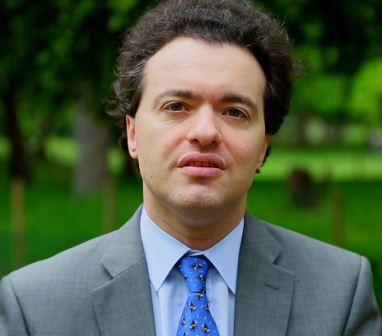In a personal journey, Kissin explores nexus of poetry and music
Evgeny Kissin’s Perspectives series at Carnegie Hall continued Wednesday night with a unique program and concert experience. Titled “Jewish Music and Poetry,” Kissin played pieces from three Jewish composers, two of them obscure to all but the cognoscenti, while in between the music he recited selections of Yiddish poems by Yitzhak Leybush Peretz.
Music and poetry of course are close companions, and can still be commonly heard together in small nightclubs and arts centers, in the context of jazz and improvised music. They are an unusual presence at Carnegie, but by no means out of place.
What did feel out of place, in a stimulating and constructive way, was how personal the program and performance where. When an artist of Kissin’s stature puts together a concert program, there is an inevitable consideration to play to the crowd and their expectations in some way—deliver a familiar piece or gesture, some trademark of one’s artistry. This was a peek into his private aesthetic world.
Kissin’s pianism was quietly superlative. He made great music out of all the pieces he played—Ernest Bloch’s Piano Sonata, Op. 40; the Piano Sonata No. 2, Op. 5, by Alexander Veprik; and Alexander Krein’s Suite dansée, Op. 44. Bloch’s Sonata is a fine piece that is essentially heard only on recordings, while the other two works are obscure enough that almost everyone in the audience was hearing them for the first time.
Kissin is known as a poetic musician, but poetry and poetry at the keyboard are really two vastly different things. And, as marvelous as his playing was, there was no emphasis on a musical-poetical approach, no milking of an extra, precious few seconds out of a held chord or a tense silence, no searching for universal and mystical truths.
The performance was earthy in the best sense, close to the core of Kissin’s personality and experience, unadorned. His great technique is equalled by his dedication to the music. While inevitably he colors the music with his taste and personality, the impression he leaves is that he is just a transparent means to reveal the power and beauty of the works he plays.
All the music was made meaningful. Each note and chord had presence. There was light and air around every attack, space to hear every detail. The sound Kissing produced all night was full and ringing.
The common thread was the idea of a culturally Jewish, specifically Yiddish, sound. Bloch used a scale close to that of a cantor’s mode in his Sonata, but that is subsumed to a fascinating hybrid idiom of neo-romanticism and mid 20th-Century American tonal modernism, with touches of boogie-woogie through the prism of Stravinsky.
Bloch’s Sonata is a substantial work. The middle Pastorale is a melancholy reflection both on the previous material and an ineffable sense of loss. The finale has a crashing, dramatic shape that descends to a quiet, mysterious conclusion.
The crowd responded to this excellent performance with tepid ambivalence, as if they had been expecting something entirely different. Yet they warmed to the poetry, which Kissin recited from memory. Seven poems followed the Bloch sonata, seven more came between Veprik and Krein in the second half, all of them concise.
In Kissin’s theatrical readings in Yiddish, the poems walked a fine line between earnestness and a slightly comic cynicism. The connection to the music was not clear until the second half. Kissin had emphasized the syntactical rhythms of the Yiddish, and it was easy to hear echoes of that in both Veprik and Krein, both of whom were concerned with making modern classical music (in the 1920s) out of Jewish folk music.
Veprik’s one movement sonata sets up a fruitful tension in stretches that are based around a single note, repeated obsessively. The music then expands into lovely song-like passages, day following night, and the writing juxtaposes Bartókian angles with touching lyricism. The harmonies are vibrant, often rich without approaching the decadence of Scriabin. It has a structural and emotional sweep that seems much larger than its relatively short duration.
Krein’s Suite dansée is positively cosmopolitan, with a fascinating and complex aesthetic that combines folk music, classical method, and an international and secular sense of taste. Kissin played five out of the full six segments, all of which are named via tempo markings, with no immediate hint of just what the original dances might be. There is more than a little Gershwin in the music, though one wonders how much Gershwin Krein could have heard by 1928. The second dance is folk music, the third is jazzy and sinuous, the fourth is a memorably gorgeous song, with melody and harmony meshing brilliantly.
What Kissin showed was not that the poetry led directly to the music, but that wrestling with tradition was a path to creativity. He extended this superb demonstration through two encores. First was an impassioned Farn opsheyd (“Before Parting”), another modernist exploration of traditional material from another Russian Jewish composer, Moshe Milner. He closed the evening with his own poem, Ani maymin (“Credo”), a funny little parable about Terah, his son Abraham, and the rewards of being different.
Evgeny Kissin plays Rachmaninoff’s Piano Concerto No. 2 with the MET Orchestra, May 19, 2016, at 8 p.m. carnegiehall.org.



